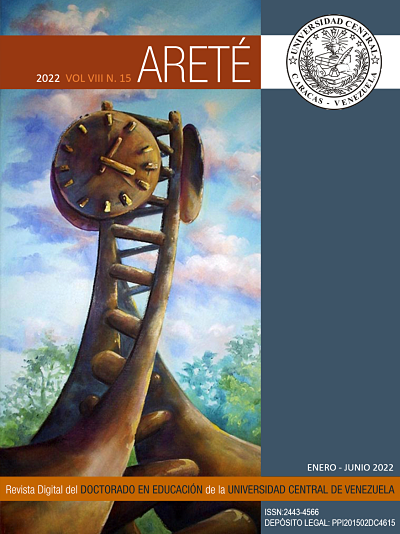Education, tolerance and humanities: an experiential reading
Keywords:
Filosofía de la educación, sociología de la educación, teoría de la educación, proceso de interacción educativa, modelo educacional.Abstract
Since its foundation, the Venezuelan State has understood the importance of education for the development of the country through the formalization and obligatory nature of instruction. With the objective of reducing inequalities and contributing to the strengthening of the economy, basic education received at its origin a correct technical and epistemological temperament. However, considering finite existence as a matter that goes beyond dealing with things, education must take into account both the experience and its relationship and immersion in otherness and not only in nature. The objective of the following article is to explore the importance of the humanities in Venezuelan education as a means to promote tolerance through a documentary methodology from a philosophical-sociological perspective. It begins by addressing the connection between religious institutions and education from the most general to the national context. Next, tolerance is problematically linked to the contemporary notion of with the intention to inspect the presence of the humanities in Venezuelan education during the “Bolivarian revolution”. Finally, a conception of education as a process is formulated which, based on tolerance and diversity (constituent qualities of the humanities), expresses its important and necessary democratic spirit.
Downloads
References
Altez, Y (2013). La estructura hermenéutica del conocimiento antropológico. Caracas: Consejo de Desarrollo Científico y Humanístico.
Berger, P. (2007). Introducción a la sociología. México D. F.: Editorial Limusa.
Carvajal, L. (2016). Baltasar de los Reyes Marrero. En Carvajal, L. (Coord.) 200 educadores venezolanos, pp. 54 – 57. Caracas: Fundación Empresas Polar.
Cassirer, E. (1993). Filosofía de la Ilustración. México D. F.: Fondo de Cultura Económica.
Da Silva, J. L. (2016). Juan David Garcia Bacca. En Carvajal, L. (Coord.) 200 educadores venezolanos, pp. 278 – 281. Caracas: Fundación Empresas Polar.
Derrida, J (1994). Las pupilas de la universidad. En Vattimo, G. (Comp.) Hermenéutica y racionalidad. Bogotá: Editorial Norma.
Durkheim, E. (2007) La división del trabajo social. México D. F.: Editorial Colofón S. A.
Giner, S. (1982) Historia del pensamiento social. Barcelona: Editorial Ariel.
Grondin, J. (2010). La filosofía de la religión. Barcelona: Herder Editorial.
Instituto Samuel Robinson para el pensamiento original (2020). Acerca del Instituto Samuel Robinson para el pensamiento original. [En línea] https://isrobinson.org/acerca-del-instituto-samuel-robinson-para-el-pensamiento-original/
Moreno Molina, A. (2016). Francisco Antonio Uzcátegui. En Carvajal, L (Coord.) 200 educadores venezolanos, pp. 44 – 47. Caracas: Fundación Empresas Polar.
Noticiero Digital (2017) Jaua: Ahora hay un solo plan de estudios en la educación media. [En línea] https://www.noticierodigital.com/forum/viewtopic.php?t=82303
Nussbaum, M (2010). Sin fines de lucro. Madrid: Katz Editores.
Popper, K. (1991). Conjeturas y refutaciones. Barcelona: Ediciones Paidós.
Ramírez, T. (2017). Educación y Revolución Bolivariana. Una pobre educación para los pobres Araucaria. Revista Iberoamericana de Filosofía, Política y Humanidades, vol. 19, núm. 38, julio-diciembre, 2017, pp. 181 – 210.
Revel, J. F. (1989). El conocimiento inútil. Barcelona: Editorial Planeta.
Rivero, Y. (2011). La educación primaria en los Códigos de Instrucción Pública de Venezuela 1843-1897. Procesos Históricos, núm. 20, Julio-diciembre, 2011, pp. 50 – 61.
Rodríguez, I. (2016). Francisco de Andújar. En Carvajal, L. (Coord.) 200 educadores venezolanos, pp. 67 – 69. Caracas: Fundación Empresas Polar.
Ruiz Sanjuán, C. (2014). La libertad en el pensamiento político de John Stuart Mill. En Mill, J. S. Sobre la libertad, pp 5 – 24. Madrid: Ediciones Akal
Toulmin, S. (1992). Cosmopolis. Chicago: The University of Chicago Press.
Valdez, M (2016) Más de 30 universidades se han creado en Revolución. [En línea] http://www.radiomundial.com.ve/article/m%C3%A1s-de-30-universidades-se-han-creado-en-revoluci%C3%B3n
Vattimo, G. y Zabala, S. (2012). Comunismo Hermenéutico. Barcelona: Herder Editorial.
Downloads
Published
How to Cite
Issue
Section
License
This journal provides free, immediate access to its content under the principle of making research freely available to the public, which fosters a greater exchange of global knowledge.
Authors who publish in Areté, Revista Digital del Doctorado en Educación, agree to the following terms:
- Authors retain copyright and grant the journal the right to be the first publication of the work, as well as licensed under a Creative Commons Attribution License that allows others to share the work with an acknowledgement of authorship of the work and initial publication in this journal.
- Authors may separately establish additional agreements for the non-exclusive distribution of the version of the work published in the journal (for example, placing it in an institutional repository or publishing it in a book), with an acknowledgement of its initial publication in this journal and not to be used for commercial purposes.
- The contents and images included in the articles are the responsibility of the author(s). Areté, Revista Digital del Doctorado en Educación, is not responsible for the information included in them.
- Authors agree with the license of use used by the journal, with the self-archiving conditions and with the open access policy.
- Authors are allowed to disseminate electronically (e.g., in institutional repositories or on their own website) the published version of their work, as it favors its earlier circulation and dissemination and thus a possible increase in its citation and reach among the academic community.
- In case of reuse of published works, the existence and specifications of the license of use must be mentioned, as well as the authorship and original source of publication.







